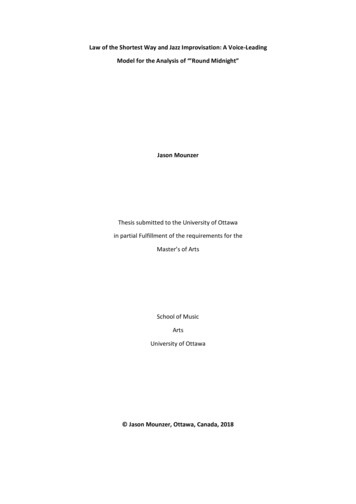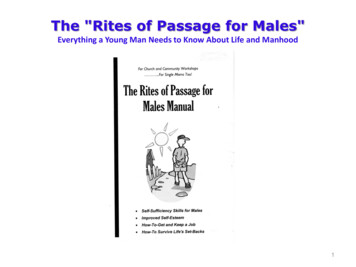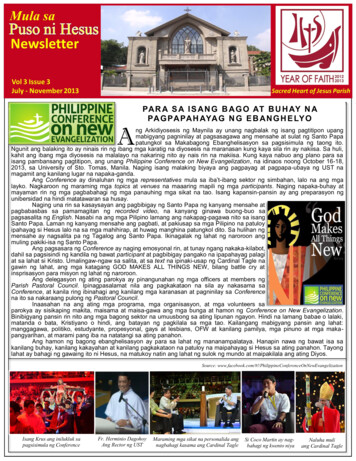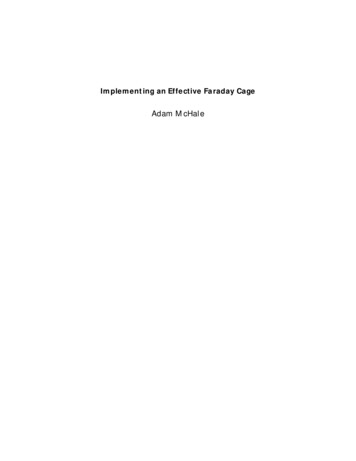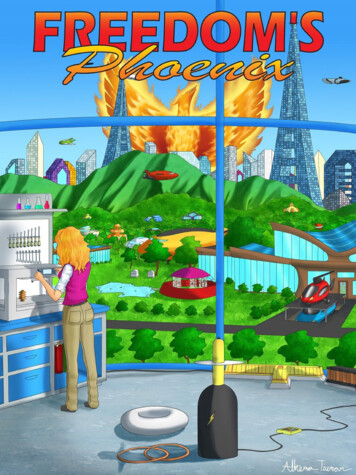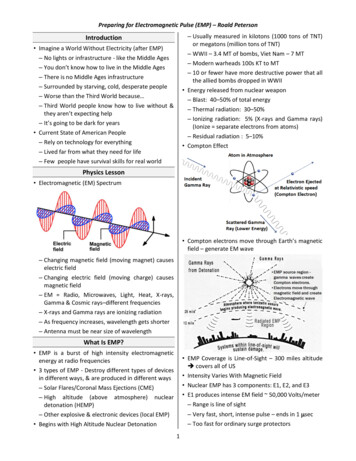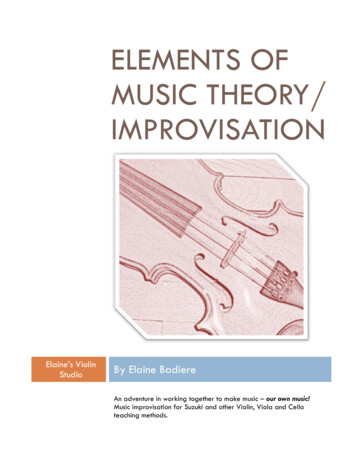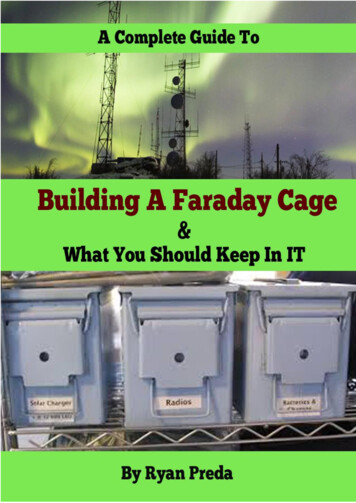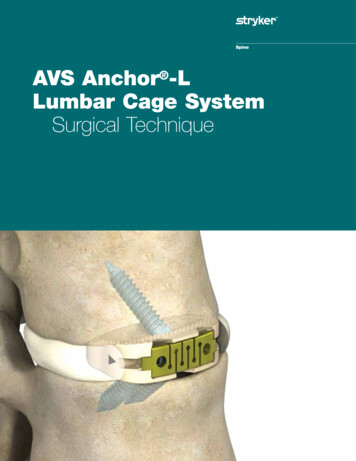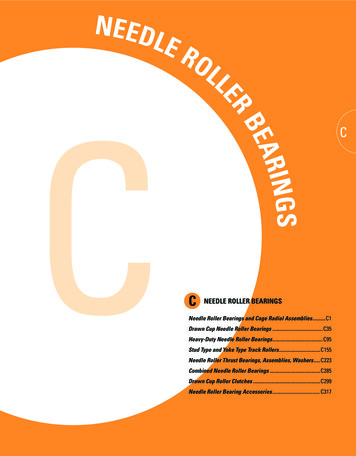
Transcription
Improvisation Rites: from John Cage’s ‘Song Books’ to theScratch Orchestra’s ‘Nature Study Notes’. Collective practices2011 – 2017
An exploration by Stefan SzczelkunNature Study Notes - Improvisation Rites 1969 - 2017The contents of this book are copyright 2018 the contributors.ISBN 978-1-870736-96-1Published in London 2018 by Routine Art Co.Printed and Distributed by IngramSpark UKRoutine Art Co is a umbrella name I use for collaborative projects
CONTENTSIntroduction4Chapter 1 John Cage’s Song Books81.1 Review of a performance1.2 Song Books organisation and process1.3 Song Books at Cafe Oto1.4 Song Books at Toynbee Studio theatre15192733Chapter 2 Cornelius Cardew’s Scratch Orchestra432.1 Nature Study Notes at Chisenhale Space 692.2 Nature Study Notes at Cafe OtoChapter 3 Archive and EvaluateChapter 4 Improvisation Rites in AthensChapter 5 Conclusions5.1 On Cage5.2 New Rites83109134154156160
IntroductionThe importance of Collective ‘Free’Improvisation1.I had been much inspired by being part of theoriginal Scratch Orchestra and in 2012 decidedto revisit its foundational document, TheNature Study Notes collection of improvisationrites, with a new generation of performers, alongside some oldermembers of the original collective. This was conceived as a hands-onway of learning about a key part of British music history. By 2017 it hadbecome something even more exciting.2.I wanted to start by exploring an aspect of cultural history that thisproject arose from - in particular the influence of John Cage, using hismagnum opus ‘Song Books’.3.I hope to elucidate why I think that these experiments with collectiveimprovisation are significant.4.This book is an account of this process using archival materials.High Art music became the bourgeois self-image. In its orchestral forms, it
represented the power of the captains of industry as they conducted their workersto ever grander achievements. But at core, bourgeois culture is literary andwritten, and published forms of language control or mediate other high art forms.The ‘written’ score by a genius composer was used to discipline and make acontrolled aesthetic form from the skills of the ensemble of workers.This form ossified into a rigid canon of ‘the classics’ by the early 20thcentury, but also became globalised with the worldwide spread of Westernmodels of capitalism. Every city that wants to be a player on the world stage hasto have its concert hall and orchestra to make itself acceptable to the jet-settingcapitalist class. In the early twentieth-century orchestral music’s developmentfractured as the limits of tonality were reached and popular music became anelectrified commodity. The gradual global spread of demands for democracy alsochallenged the relevance of the hierarchical authoritarian forms of ‘classical’music.John Cage suggested we ‘start from scratch’, listening to the soundsthat emanate from the world. With others, he reinvented the score using a widerange of graphic marks. But it was Cornelius Cardew who decisively challengedthe hierarchical form of the orchestra and concert with the Scratch Orchestra,that he started in 1969 with Howard Skempton and Michael Parsons. Althoughthere was a core of dedicated classically-trained musicians, anybody could joinand ‘play’. The scores were made to be accessible to anyone, and the concertswere organised by the youngest members first. I will say more in Chapter 3.In the Scratch Orchestra of 1969 we were able to collectively express our innerworld with a startling degree of freedom. It was a fantastically liberating feelingat the time. But amazingly, using similar approaches nearly 50 years later, inAthens Greece, the liberating effect was palpably similar.The initial idea for the recent project was to work with a youngergeneration of improvising performers to transmit the Scratch Orchestra praxis bydoing it rather than by reading about it. A group of original Scratch membersworked alongside me with a larger group of invited younger artists. We met anddiscussed things over a long period to create something of the feel of the‘original’ Scratch Orchestra.I see the significance of improvisation in large groups as important
because it parallels a larger process of cultural formation. It is a microcosm ofthe symbolic exchanges that we make whenever we are ‘playing’ together.Improvisation tries to find ideal conditions of creativity, interactivity, empathyand listening that might make for a more dynamic, and less authoritarian kind ofsociety. It allows people to experience the power of joining their inner desires ina process from which a collective form comes into being.The aim of this bookThis book attempts to reproduce material that was close to the process that wewent through together, by using the emails and other ephemeral writings by meand other members of the group. It is meant to give an insight into processesrather than providing a gloss on final appearances. The feel is partly of anarchival narrative collage.I hope the book is accessible to people who don’t know the ScratchOrchestra, as well as those who were involved in some part of the processdescribed. We started our exploration with a composer who, came beforeCardew and broke the mould of orchestral music making - John Cage. There is adescription of both the scores that were used. ‘Song Books’ is one of JohnCage’s main scores, and ‘Nature Study Notes’ is the set of verbal scores that wasat the heart of the Scratch Orchestra from its inception in 1969.AcknowledgementsThanks to Howard Slater for early editorial work on organising material andgiving it a rough shape. Thank you, Ali Warner for giving the whole a consistentformatting design and for copy-editing the first half with unearthly precision.Thank you, Carole Finer for all the supportive radio shows she made in thisperiod. Then, there is the marvellous performance photography by MartinDixon, Deidre McGale, Emmanuelle Waeckerle and Stathis Mamalakis. Thanksto Bryn Harris for audio recording most of the performances. Recordings whichcannot of course be included in this paper book.Photographs without credits were taken by the author.
Chapter 1John Cage’s ‘Song Books’Carol Finer performing Song Books atCafe OtoJohn Cage’s ‘SongBooks’ 1970My aim, with the projectdocumented here, was to finda way to explore the ScratchOrchestra’s improvisation rites from the late Sixties with a new generation ofperformers. So why start with John Cage (1912-1992)? One reason was thatCage was better known than Cornelius Cardew (1936-1981), founder of theScratch Orchestra, and the year of our proposed performance was the centenaryof Cage’s birth so there was widespread public awareness. Cage was prior toCardew in establishing certain performative modes that the Scratch Orchestrathen developed in a radical and more political direction. The deeper reason fordoing this double-barrelled project was that I’d observed that, as the modernistmusic of this period was reprised, it was being drained of its originalunpredictability and performance art edge. It was a trend that was happeningacross the board. I include a review of one highly-disciplined and preciseperformance of ‘Song Books’ to illustrate my point, for those interested.Description of Cage’s magnum opus‘Song Books’ is a collection of 90 separate solos for voice arranged in twovolumes. It was published by Editions Peters in 1970, with another slim volumeof instructions and additional material. Each volume was bound along the short
edge with a plastic comb-binding. The set cost over 100 which thankfully myworkplace, the University of Westminster, paid for.Cage’s directions stipulate that the solos can be performed with orwithout other indeterminate music, and that they can be used by one or moresingers in any order and be superimposed or repeated. To complicate the idea ofa song, some of the solos are directives for theatrical activity. In fact, there arefour categories of solo: straightforward vocal song, song using electronics, songas a instruction for theatrical action, and theatre with electronics. Each of thesolos is marked as relevant or irrelevant to the subject: “We connect Satie withThoreau.”Singers are directed not to co-ordinate the programmes that they makewith other performers e.g. “Any resultant silence is not to be feared.” Performersare told not to respond spontaneously to juxtapositions that occur by chance i.e.“They should continue to perform their programme, come what may”.I was intrigued by the instruction to ‘connect Satie with Thoreau’. Eachsong is marked a REVELANT or IRRELEVANT to this notion. It implies acognisance of the rich transatlantic background of both John Cage and modernistexperimental culture and its connection to utopian thought.Henry Thoreau (1817–1862) was born and lived in Concord, Massachusetts, USA. Erik Satie (1866–1925)was born in Honfleur in Northern France, and lived in Monmartre, Paris.This is sometimes directly referenced in the individual songs, e.g. InSolo 30 a text collaged from Thoreau’s Journal is given conventional musicalnotation. The first two lines from Solo 42 are also quoted from Thoreau:“Wasps are building; Summer squashes; Saw a fish hawk, when I hear this; both bush-es andtrees are thin-ly leaved; Few ripe ones on sand-y banks; Rose right up high in to the air.”Another long, conventionally notated piece quotes from the firstparagraph of Thoreau’s ‘Essay on Civil Disobedience’ (Solo 34 and 35). Thescore of Solo 5 is an simply an engraving of Thoreau’s face. We are instructed to“Wander over the portrait of Thoreau so that the path taken suggests a melodicline.” Bron Jones is here, shown performing the face of Thoreau.
Atext byErik Satie,used inSolo forVoice 43, is presented with a varied typography reminiscent of the ConcretePoetry of the time i.e. “et tOUT CELA M’Est advenu PAR LA FAUTE DE lamusique.” (And all this happened to me through the fault of Music.) Fourdifferent versions of the same text are presented, and we can imagine Cage hardat work with his Letraset.
The solos vary from very simple instructions to a whole range of graphic scoresthat were cutting edge at the time. Examples of verbal instructions are:SOLO FOR VOICE 51, THEATRE WITH ELECTRONICS (RELEVANT)DIRECTIONSPlay a recording of a forest fire.
SOLO FOR VOICE 78, THEATRE (IRRELEVANT)DIRECTIONSWhat can you do?“I can take off my shoes and put them on.”Beginning to organise a groupDuring the preparations for getting a large ensemble together to perform JohnCage’s ‘Song Books’ – in itself a warm-up before performing The ScratchOrchestra’s ‘Nature Study Notes’ – Peter Ellison alerted me to a recentlyannounced rendition of the ‘Song Books’ by the Exaudi Group at King’s Place.Stefan’s email to Peter Ellison (early in 2011)Thanks for alerting me to this Peter . Yes, we must try to go!! Never heard ofKing’s Place before! Eeek! the establishment have got to ‘Song Books’ first!!Interesting that a previewer, Christopher Fox, referenced Trevor Wishart's workwith voice. (Wishart had been an occasional ‘Slippery Merchant’, our anarchicsub-group within the Scratch Orchestra.) Fox basically goes on to argue: “TheSong Books work best when the balance is firmly tipped in favour of virtuosity,so that the more theatrical actions become incidental to the overall vocalspectacle." He goes on to talk about Cage’s theatre instructions that he thinks areoverly easy to perform.This seems a mild statement, but in here hides the whole ofthe establishment ideology of exclusion; of drawing hard edges to valid aestheticcreation within an area of excellence, discipline and virtuosity. We would have todiscuss the form of discipline implied to make full sense of this. He marks thevirtuosity of the trained singers above the aesthetic and joy of ordinary actions –I can't think that Cage would have approved of this.I invited the first younger generation improviser to show interest, AliWarner, to come along.Ali Warner’s email to Stefan
An unexpected next step in our project! I went to King's Place for the first timerecently (for an acapella voice festival) and I actually didn't enjoy it as a venue,as it is vast, cavernous and modern, so doesn't feel very hospitable inside.They tried to put a trio of female voices on in the foyer (mezzanine balcony) –one singer couldn't see above the barrier rail – and they were drowned out by allthe noise that a large hard-surface space with high ceilings and lots of peoplecreates.The concert halls themselves seemed good - lots of wood and quite anintimate feeling. I noticed on the website that ‘Kings Place won Business Venueof the Year at the 2010 Visit London Awards’ which might say something aboutthe tenor of the place. But they seem to have interesting programming, I justdidn't find it very welcoming.In terms of the Guardian article, I found that Cage's original quotedremark (freedom versus 'foolishness') spoke to me in terms of what I have beenexperiencing myself in explorations with form & formlessness, and I thought itwas a good one to raise – however I don't think the writer's conclusion that‘therefore we need virtuosity’ is the only or correct one. What is would beworthy of more discussion!Stefan, could you bring the Songbooks score or copies with you? (or doyou think it would be inappropriate to refer to them during the performance!) Iwill also tell any singers I am in touch with, and it would be good to be able tomake contact with the singers you have mentioned if they are able to come.”
Chapter 1 Section 1A review of John Cage’s ‘Song Books’ (1970) by Exaudi, King’sPlace, London, 28 March 2011The performance space was a flat studio about 20 metres square, with a blackcurtain and a stage on one side. The seating was in rows of moveable chairs andthe singers were arranged on the stage, to the side of the stage, and to the rear ofthe stage. The evening was sold out for this rare performance.The performers were dressed as we might expect with ‘serious’ music,they looked like bank clerks without their jackets and ties on. The electronicsman, Bill Thompson, had his shirt hanging out. One man in black haddreadlocks. But who was the character with the big furry hat on stage looking athis MacBook? About half-way through the hour-long performance a technicianjoined him on stage as if something had gone wrong with whatever the laptopwas in charge of. Later he walked off as if in a huff. Had something gone wrong?
The Cage masterwork was rather crammed into the hour, and I wondered if thiswas because they were aiming to make a CD. There was a gap in the market fora recording of ‘Song Books’. Also, the performance, which was polished,seemed to have a rehearsed feel to it. The random juxtaposition of pieces seemedto go all too smoothly with few lulls or cacophonic pile-ups that we might haveexpected. The score isn't smooth, its all bitty with variegations of textures. In thecatalogue, James Weeks, Exaudi's director, describes the scored songs asbeautiful, which is strange because they often seem quite ugly compared to, say,the graphics of Cardew's ‘Treatise’. Certainly, Cage is no great graphic artist, butthat's not the point anyway.Why was it so smooth? Why shouldn't it be smooth? Theprofessionalism of the troupe is not in question. What is in question is whether aprofessional sort of discipline can give us a satisfactory rendition of ‘SongBooks’ which is comprised of 48 scores needing various levels of musicalability, and 42 instructions for 'theatre'. The need for perfect timing and pitchdominated the visuality, with stopwatches hanging like medallions and tuningforks struck on knees to intone a song. The actual theatre-half of the concert wastastefully kept on table tops that were hardly visible to most of the audience. Thevisual impact of the concert was perhaps just 5%. Of course, if your aim is tomake a CD that’s understandable, but might more overt theatre performanceshave dislodged the cosy safety of the delicate virtuoso singing? But couldn’tthis also have meant that the CD would have had a bit more edge, danger,excitement? A bit more feeling for the era of its creation in 1970 and ‘the spacebetween Satie and Thoreau’, that half of the pieces are meant to be enactedwithin, was needed. Seventies radicalism was a distant prospect here, despite theanarchist song being repeated at least 3 times in some nice, if subdued,variations: expressing that ‘The best form of government is no government atall’.The troupe’s dress-code reminded me of an administrative centre. It feltlike ‘Song Books’ had been administrated for the new millennium, and in time tobe on sale in the shops by Cage anniversary in 2012. Certainly, commodificationand comfort were words that came to mind.The other thing that spoilt it for me was the use of microphones onstands to render vocals for electronic modulation. The scores just say 'with
electronics' or not. This doesn't mean that the voice has to be wholly modulated.The microphone stands emphasised the fixity and anal rigidity of it all (andanyway, I hate unnecessary amplification of the human voice as it is soreductive).To be fair, there were moments of loveliness which you might not guessfrom my diatribe! The babel of voices near to the end, that came out from anearlier linguistically impenetrable libretto, seemed to be very relevant to theLondon of today, with its many spoken languages. But even such moments didn'tsave it from trampling on the memory of John Cage, rather than investigatingwhat he meant when he said that he wanted to ‘start from scratch’.Kings Place itself intones an atmosphere of professionalism and mentalhygiene. It is a corporate environment, in which art is gathered to provide athrone for The Guardian Newspaper which seems to inhabit the upper reaches ofthe building. The space inveigles against the cultural freedom that I alwaysimagined that Cage was reaching out for. With ultra-professionalism comes apretentiousness and discipline that curtails the human spirit. It is perhaps adanger inherent in such scores. But anyway, it’s not a home for the live andliving avant-garde. When Ali sung a workers’ folk song on the way out it waslike a breath of fresh air, making us realise what a conditioned environment wehad been in.A central problem of realising ‘Song Books’ is whether you do a retroversion, or try to realise it with contemporary idioms. Do you actually use an oldtypewriter for its clickety-clackety sounds? Do you evoke ‘the space betweenThoreau and Satie’ as Cage asks of his performers in his introduction. In otherwords, to consider the ‘space’ between the European and the North Americanavant-gardes, or do you think of what is today’s equivalent?Ali Warner to Stefan and PeterI think this is a perceptive review – at first, I was surprised when you divedstraight into the practicalities (although perhaps this is the theatre/stagingperspective that we reflected was not so in evidence in that production), and atthe same time I liked the way you brought out the furry hat affair so early on –this was figural for me! By the end of the review, you really have touched on allthe key points of the experience for me, plus shed some new light – referencing
the all-important stopwatches (and the singer that we thought looked likeSamantha Cameron who had a habit of checking the watch on her inside wristtoo), the high-point of vocal layering near the end, the description of the building‘intoning mental hygiene’ - brilliant! Plus, The Guardian in the upperreaches/fresh air vs. air-conditioning - this applies to the sound quality as well asthe air, I think.I noticed that about the typewriter too – it almost seemed out of place,i.e. something else would have met Cage’s instruction better – particularly givenhow many powerbooks were in evidence!Lovely to meet you, Peter, and hope to get more chance to talk to youat our next meeting. Stefan - I have the article for you that I mentioned, and willtry to get it copied to send. I really enjoyed our conversation (by the way, do youhave any interest in going to see the Laurie Anderson exhibition at theBarbican?). Look forward to continuing to be in touch with you both.Chapter 1 Section 2Song Books: Organisation and ProcessA group of performers wanting to take part in the project gradually built up,almost entirely through word of mouth and recommendation from originalScratch members. The original Scratch people at that time in 2011 were myself,Peter Ellison, Carole Finer, Carolyn Rogers and John Tilbury. The younger newpeople that had confirmed an interest were: Bron Jones (former singer in Crass
performing as Eve Libertine), Ali Warner, Renate Biruls, Sharon Gal, PortiaWinters, Robbie Lockwood and Lucy Galland.Around the same time, I met Hamish from Cafe Oto in North Londonand sensed he was interested in the project, I had been writing to him but hadn’theard back. After months, I finally got a positive offer and we decided to take adate on Sunday 11 March in the following year. Not the most popular eveningslot, but it was a ‘no money up front for a share of the door money’ deal and wehad no funding. Now we had something real to aim for.Stefan Szczelkun’s email to the groupDear Song Books peoples! In an hour, I am going to send an email to Hamish atCafe Oto to confirm Sunday 11 March 2012 as the date for our first performanceof 'Song Books'. I'm really pleased to be able to finally confirm a date! I feel wehave a powerful core group now, and we can expand it if we wish. For the nextfew months, I think it best if we concentrate on forming our own ensembleapproaches and, if possible, meeting each other - even if only incrementally. Feelfree to take initiatives to create meetings or communicate with each other.I'm going to Oto on the evening of Tuesday 21 June for the launch ofthe Paul Burwell memorial book – if anyone is interested, please do join me.Then Ali, Bron, Carol and I are going to meet at Oto for a lunchtime discussionon Sunday 17 July – let’s say 1–3pm. Unfortunately, Robbie and Peter may notbe able to make that, but it’s the best we can do. This meeting should, I think,concentrate on thinking about the singing.We will need to find one or more electronics performers. There areseveral possibilities - no rush. There is also the question of recording a radiobroadcast on Resonance FM (Carol Finer has a regular programme).Stefan to Ali and the groupHi Ali, yes, maybe it’s good if the main people with singing skills can all meeton the 17th - that’s only four in all. I think it’s good if they can meet me - andCarole Finer - at this early stage as well. You core singers need to be in charge ofhow you approach the score; the distribution of songs; how long the performanceshould be; whether to use your idea of wearing numbers relating to the song you
are doing; how you appear in publicity; how the songs chosen appear inpublicity or not; how you want to use the space in Cafe Oto; what the meaningof the space between Satie and Thoreau is; how the electronics should beconducted, etc. etc. And you can all look through the whole score, which I willbring along. We probably need to end up with twice as many singers byFebruary, but if the core has decided some basic strategies then the others canprobably fall in with this.Stefan to the groupThe next ‘Song Books’ meet-up is on Tuesday 20 September, 6.30pm-9pm, atMadame Lillie's in Stoke Newington, N16 6BD (I have no surviving record ofour improvisation session).I've realised that the photo-portraits I took with a GoPro camera are acomplete distraction from what we're doing. So I won't use them or put themonline. Thanks for the feedback (people hated them!).I will be available in my office at 32 Wells Street, W1T 3UW for scorestudy sessions on Thursday 21st 10.30am-4pm, Tuesday 26th 2-4.30pm,Thursday 28th 10.30am-4pm and Wednesday 3rd August in the morning. It isbetter if two or more people can come together. Maybe Ali can co-ordinate?Minutes of the meeting starting in Cafe Oto (30 October 2011)Present: Bron, Carole, Stefan, Portia, Renate & Geri (Robbie and Lucy visitedbriefly for the start of the meeting in Cafe Oto). Apologies were received fromAli, Carolyn and Peter.The main ingredients were:1. Robbie and Lucy introducing themselves and the idea of themmaking video documentations that might take some part in the performance. Ithink they will contact Bron and Portia to shoot some process footage, as theylive in the area. They then left Cafe Oto to do a job.2. Next, we had a lovely autumnal walk from Cafe Oto through the
backstreets of Dalston and Butterfield Green to Bron's beautiful studio space.When we arrived there, we tried out Portia's home-made contact mikes and hadtea. Then Bron gave a talk on Thoreau, which gave us more insight into Cagethan some of us had expected. Hopefully she will write up her notes so otherscan share this. Portia will do her talk on Satie next time.3. Geri then arrived, and we discussed her proposal that theperformance should be 'durational' rather than an intense 60 -100 minutes. Agood discussion without a very definite conclusion. Probably we will do aconventional performance length, without interval, at Oto. Time to bedetermined when we have all got further in deciding which of the songs we wantto perform. Perhaps we could follow up with a durational performance atGoldsmiths College in Spring 2012? It was suggested we each draw up a posterof the scores we are doing - only to be unveiled at the actual performance (as weare not meant to co-ordinate our individual programmes).4. I have been wrong in promoting the idea of a chance arrangement ofeach of our pieces. What the general instructions actually say is: “Given two ormore singers, each should make an independent program, not fitted or related ina predetermined way to anyone else's program. Any resultant silence in aprogram is not to be feared. Simply perform as you had decided to, before youknew what would happen.” (John Cage, from the ‘General Directions’ in ‘SongBooks’, Oct 1970)Later Note: A key difference between Cage and Cardew? Cagepreferred chance operations whereas Cardew was for rational choice.5. I made a suggestion, with which people generally concurred, that weshould not try to meet again this year as an ensemble. This does not mean peopleshould not meet individually to try out stuff e.g. Geri and Ali to meet up withGrundik? Portia and Renate to meet up with Ali? Robbie and Lucy to meet Bronetc. Then we should have two quite long meetings in the run-up to the Otoperformance in March next year. The best dates seem to be the Sunday January29th, and February 26th. But if you can't do either of these, please indicate otherSundays in between that you could do.Basic arrangement: to meet at Oto at 1pm and work until at least 5pm, possibly
eating together in the early evening.Civil disobedience at every opportunity, please.P.S. We need a publicity image or photo. Anyone got any ideas?Stefan to the groupHow about this photo as a holding publicity shot for the Cafe Oto website?Portia Wintersto the groupHow's the civildisobediencegoing? It was abeautifulmeeting. I'mlooking forwardto the concert inMarch. Alsolooking forwardto hooking upelsewhere withanyone whofancies it.I'm reading Walden at the moment, and very much enjoying it. It's alsotying into a project I'm working on with recordings from my garden; of theenvironmental drones and hums, the trees/leaves/fridges/aeroplanes etc., and thesinging of resonant frequencies found within these recordings.The re-reflections of Thoreau's interests through this other project arelinking together in the head for me with the sensibilities of the performancestructure of Cage's voiceworks, and I'm finding in my thoughts an interestingleap between the centuries.
“If a man does not keep pace with his companions, perhaps it isbecause he hears a different drummer. Let him step to the music which he hears,however measured or far away.” (Thoreau) And [play] as a response toenvironmental and media-voice saturations of daily experiences here and now.Autumn leaves! They're EVERYWHERE at the moment.John Tilbury to StefanDear Stefan, an apology. I’m so sorry. You are on my list of invitees to a soireein Finsbury Park, but somehow, I omitted to contact you. It’s a performance of alate Beckett novella, ‘Worstward Ho’. I have pre-recorded the text andaccompany myself live at the piano. It’s something I have been working on for afew years now, finally come to fruition. It’s tomorrow, Saturday, 6.30pm for 7.Lasts 80 minutes so will be finished around 8.30pm.Stefan to the groupHi all, Orlagh Woods from the New Work Network is looking into the possibilityof us doing a performance of ‘Song Books’ at a ‘Late at Tate’ in the autumn. Ifthe Tate go for this then she will make an application for funding, so we couldeach get a small fee.I'm not sure how likely this is to come off, but thought I'd let you knowin case you have any views. I made it clear that you'd have to agree and the Tateis being approached with that caveat. If that doesn't happen, there is also thepossibility of doing it at the Toynbee Studios - a very nice intimate theatre spacewith an enormous stage in Aldgate.Hope to see some of you this Saturday at the Cardew concert inConway Hall. I'm not sure if I can get there early. Carolyn has suggested meetingat 12.30 or 1pm. Please contact her if you can do that.Jane Alden to StefanI am honoured that you want me to participate in Song Books on March 11. Ilook forward to being in touch with you and the others about how I should
prepare (which songs, etc.).I have booked my flight from the USA now. Getting in Saturdayevening, so should be ready to rehearse at 2pm on Sunday afternoon.I went to the Eddie Prévost launch at Cafe Oto this evening. Niceacoustic.Looking forward to it!Stefan to JaneHi Jane, Great to meet you at Conway Hall yesterday.
Cage’s ‘Song Books’ – in itself a warm-up before performing The Scratch Orchestra’s ‘Nature Study Notes’ – Peter Ellison alerted me to a recently announced rendition of the ‘Song Books’ by the Exaudi Group at King’s Place. Stefan’s email to Peter Ellison
